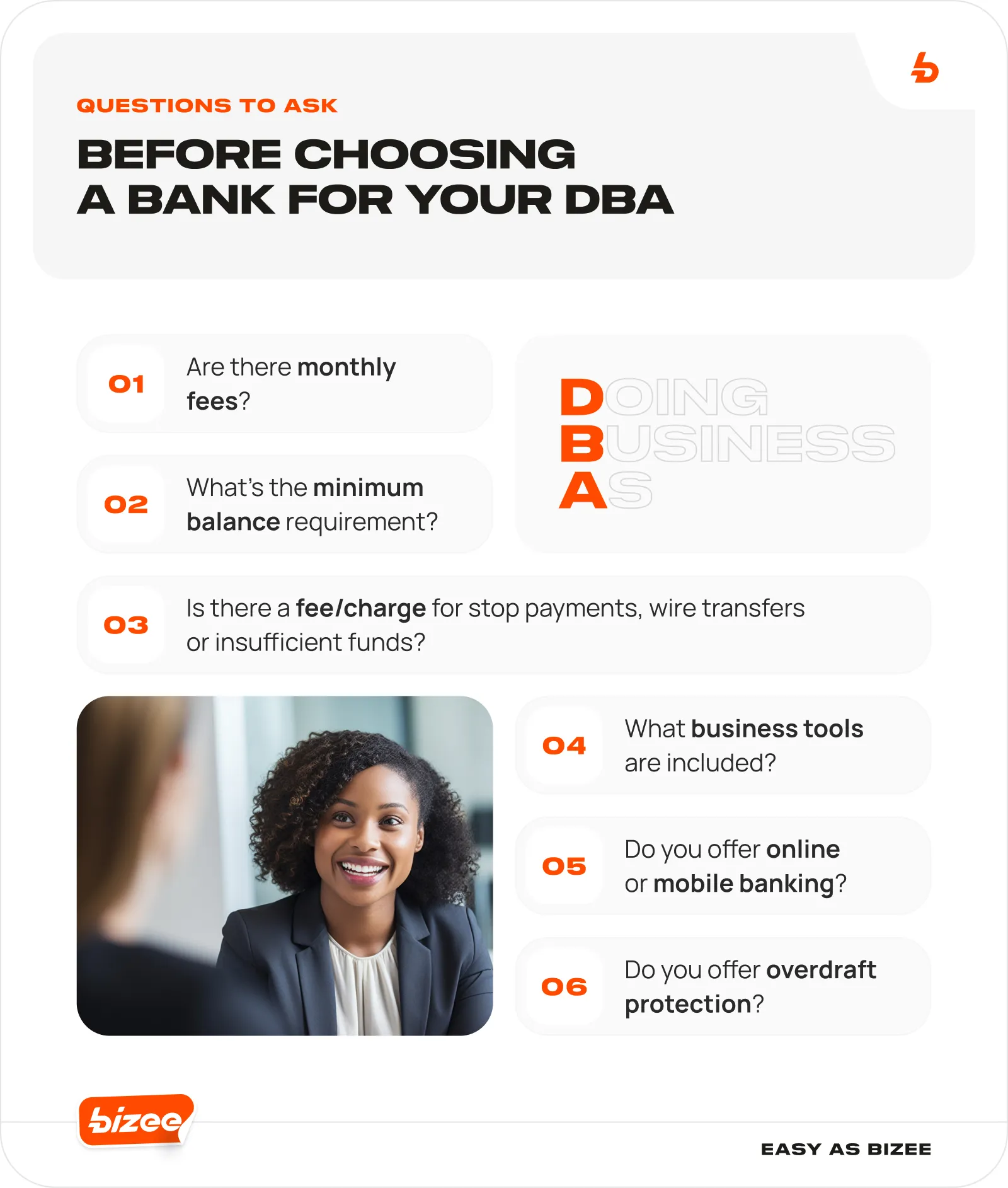S etting up a bank account that’s dedicated to your business and separate from a personal account is a wise move — and it's even required, depending on your business type.
If you have a DBA (doing business as) for your business and wish to open an account for your DBA name, read on for how to do so.
Can I Open a Bank Account with a DBA?
Whether you are a sole proprietor or LLC, you can open a dedicated business bank account for your DBA. Having a business bank account provides you with a paper trail for all your business transactions, and your bank statements will help with record keeping and when it comes to filing for taxes. This applies equally whether your business is brick-and-mortar or you are an online business .
Once you have your DBA license from the state, the next step is to choose the right bank to do business with. It also helps to see what banks are offering when it comes to opening up a business bank account. There may be a promo with free checking, no maintenance fees or even cash-back programs.

It’s also a good idea to look at reviews and also learn about their customer service capabilities.
How to Open a DBA Account
Opening up a business account for your DBA is fairly straightforward. You can either open up an account online or by visiting a branch office. Key documents that most banks will ask for when setting up an account will include:
- Business license
- Social Security Number (SSN) or Employer Identification Number (EIN)
- Driver’s license or other form of acceptable photo identification
- DBA certificate with the doing business as name
Depending on the entity type, you may need additional (organization) documents. For instance, if you are an LLC, you may be required to provide your Articles of Organization and/or Operating Agreement. And the final requirement for setting up the account is an opening deposit to fund your initial banking activities.
As soon as your business account is set up, you can use it to pay bills and accept payments. Your bank account will be under the name of your DBA, so make sure it matches your state’s paperwork.
You should also make sure to notify the entities that you do business with (vendors, suppliers, customers, etc.) to let them know of your DBA status. This way, they will know who to make payments to, as well as the name of the fictitious entity that they should expect payments from. When depositing checks into your business account, it is important to make sure to endorse the checks with your DBA name.
Having Multiple DBAs Under One Bank Account
Although banks will allow having one bank account for multiple DBAs, this option may not be the best path to follow for your business. For one, it complicates the bookkeeping process. So unless you are very organized, having separate accounts for your businesses may work best.
It will also help avoid any confusion with the different DBAs and will allow you to track the financials for each business. And if, by chance, one of your DBAs gets sued or audited, it’s easier to go over the records if there is a dedicated account for that business.
Can I Add a DBA to My Personal Bank Account?
If you are a sole proprietor and your name is your business name, then you can use your personal bank account. For instance, if you are a general contractor and your name is Brian Smith, payments will be made to Brian Smith. In this example, Brian Smith’s personal and business assets can go in the same pot — or bank account.
If, however, Brian Smith already owns an LLC called Keystone Construction with its own bank account but now wants to form the DBA Keystone Landscaping, then he should consider having a separate bank account for his new business endeavor.
Having Keystone Landscaping’s account separate from Brain Smith’s personal bank account can help protect Brian’s personal assets from any lawsuits or other liabilities made against the business. This is especially true if the DBA is formed under his LLC.
Benefits of a Business Bank Account for Your DBA
There are a number of benefits when it comes to having a dedicated business bank account. For one, it makes your company look professional. Instead of customers making payments to your personal bank account, they are writing checks and directing funds to your business name.
Secondly, using a business bank account will help you establish business credit, which in the long run may provide you with better terms on loans.
Thirdly, your record-keeping is simplified and you are better able to manage and monitor your finances by knowing what is going in and what is coming out of your account.
Finally, there are a number of perks offered by banks aimed at business owners. These sweet deals can add cash to your account, waive fees and provide you with the tools you'll need to stay on top of your business's finances.
If you're ready to get your business bank account, Bank of America can get you started with setting up your business checking account, company credit card and the tools to help with your accounting needs.








